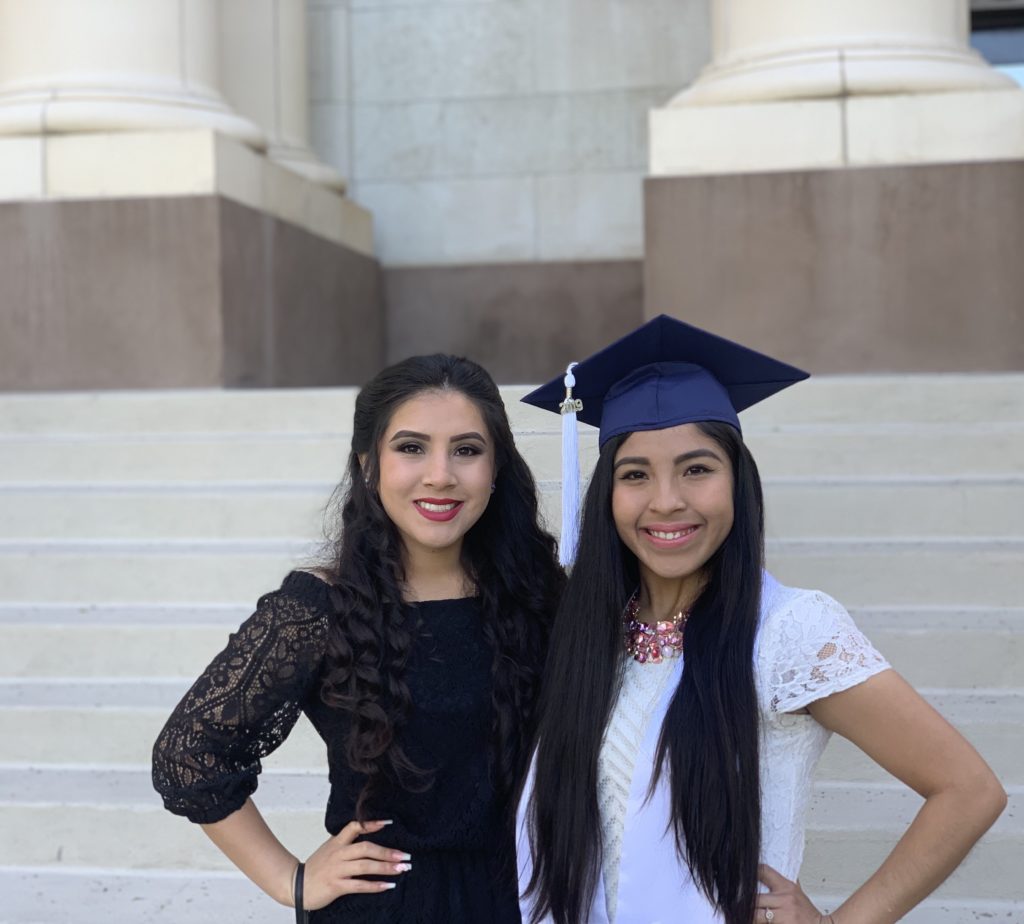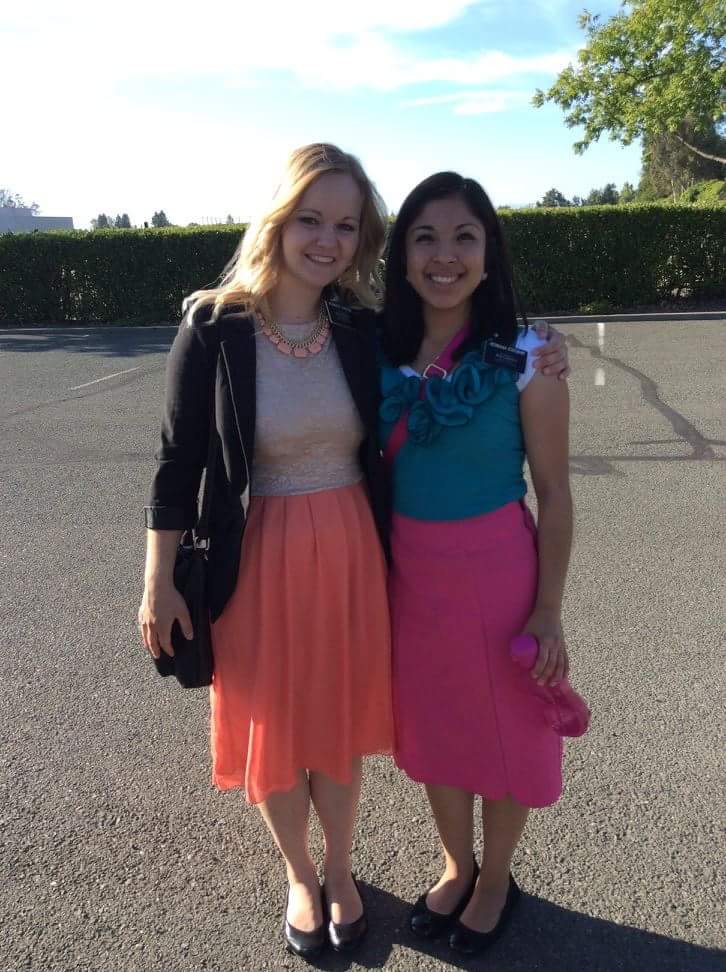By Perla Escobar
Leer en español: El punto de vista de un estudiante DACA de BYU

Editor’s note: Perla Escobar is a DACA student from Tamaulipas, Mexico, who came to the U.S. when she was almost 10. She graduated from BYU with a bachelor’s degree in translation in 2019 and is currently working toward a master’s degree in Hispanic linguistics.
Dreamers can continue to dream, work, study and contribute to this society as our rights to legally belong to this country continue to be protected and supported by the U.S. Supreme Court. We have a dream that one day we will live in a nation where we are not judged for not having a U.S. birth certificate but by our character. By going beyond a temporary ruling that opens the doors for us to stay and become legal U.S. citizens, we can work together to truly become the nation of freedom, justice and equality we all envision.
Like many minority students, especially those who are first-generation college students, I have experienced many bitter moments that have taught me about background, racial and economic differences.
I did not have the opportunity to tour campus before moving in. In fact, two years before moving to Provo to start college, I would not have had the privilege of getting on a plane if President Barack Obama had not approved DACA (Deferred Action for Childhood Arrivals).
Flashback: A wall in education
My freshman year of high school, my dad started talking to me more seriously about college. The first time I heard about BYU was from my dad. He was not acquainted with the college application process, but he knew that BYU would be a good option. He told me that if a way became possible for me to study there, he would do everything to support me. For this reason, I spent my time on activities that would increase my probability of going to college.
Sometimes I wonder how I was able to navigate the American school system — AP courses, tons of extracurriculars, resumé-worthy schoolwork — without even hearing about affirmative action or the achievement gap until I was in Provo. My classmates did a great job in being examples I could follow: they would talk about weighted GPAs, next year’s AP courses and getting an associate’s degree by the end of high school.
My parents always told me that the best way to guarantee a college acceptance, and hopefully a scholarship, was to study hard and have faith that God would provide after I did all I could. Furthermore, what made it more likely that I would attend college was the creation of the DACA program in June 2012.
Under this program, individuals like me who were brought to the U.S. as children would be temporarily saved from deportation and would be given a renewable two-year work authorization. The program does not provide a path to citizenship. After the program was approved, my parents went to a lawyer right away to get the paperwork started. Within a few months, I was legally able to work and study. DACA allowed me, and many others, to start turning dreams into actions.
When my senior year of high school started, FAFSA application flyers were all over the place. During the application process, I realized that although I was now legal, I was not eligible to apply for financial aid. My dad had mentioned multiple times he would help me, but I knew it would still be difficult to afford a college education for four years.
Some counselors and teachers kept telling me about scholarships I could qualify for, but what they didn’t know was my status. I found out about local scholarships that didn’t ask for my legal status and I applied to all of them. Thanks to generous donors, I had the funds to start a family goal of attending college. In June 2014, I got on a plane for the first time to move to Provo.
The unexpected: Cultural shock
Walking around campus for the first time filled me with happiness and hope to begin a bright future my parents had worked for. I was thrilled to begin the whole college experience. Still, after my arrival in Happy Valley, cultural differences became visible because as a first-generation, DACA, and Latina student, I did not fit the mold of a Provo student. I didn’t speak “perfect” English or come from parents who graduated from BYU.
One of the first experiences that showed me these differences was finding out that college students usually get dropped off by their parents. When I arrived at the Salt Lake City airport, three great friends who served their mission in the area of my home in McAllen, Texas, helped me move in. Without their help, I would have been on my own. So, when my roommates arrived at the apartment, they asked me if my parents had already left. I looked around and realized that their parents were with them. After observing how their parents took them to Costco and helped organize things around the apartment, it hit me that this was probably the norm. All of them were nice to me, and I never felt bad about not being dropped off by parents. I just felt different and curious because once again, I was in the process of learning about college life in the U.S.
The first day of school finally started and I hurried, thrilled to meet new people. By the end of the day, I felt out of place. In all three of my classes, including Spanish 321, I was the only person who spoke with an accent, which lead to the common remarks: “English is not your first language, right?” “You sound different” or “Where are you really from?”. Since many of the missionaries who served in my ward came from Utah, I had anticipated different demographics than those from the border. This meant I was aware that I was going to a place that did not look like I was still in Mexico. However, I had not emotionally committed nor prepared to often being the only brown person in a classroom. It was strange to feel like the only one on campus who was foreign.
Once again in limbo

After my first semester, I went to California to serve a full-time mission. When I returned to BYU, I went to the International Student Services Office to learn more about several scholarships I thought I qualified for since a few universities across the country had started providing scholarships for DACA. I used to be categorized as an international student even when I had completed middle school and high school in the U.S., and that’s the reason I thought I could apply for a scholarship in the future. I was told by one of the advisers that because I was not really an international student and didn’t have an F1 visa, I did not qualify for any scholarships. Instead, I was sent to the Multicultural Student Services Office.
Again, I was told BYU did not have any form of financial assistance, not even loans, for DACA students. The advisor told me that I could use the BYU loan that all students have access to: I could pay a $20 fee every semester to pay tuition by the end of the semester instead of the beginning.
I was miserable because it felt like no one could help me or understand me. Five years later, I am grateful for always having a job that helped me pay all my BYU loans at the end of each semester and for the small, steady changes that have taken place. My junior and senior year, I participated in a few confidential gatherings for DACA and undocumented students at BYU. I saw for the first time that although our economical and social struggles were painful and often limited us, we were not alone because there were some BYU administrators who cared about understanding us and sought to provide more resources. Today, DACA students at BYU can qualify for a loan and for a multicultural scholarship.
Introspection: How do you view others?
What once looked unreachable due to my legal status finally happened: I graduated from college in 2019.
I am aware that others have faced more challenges in receiving an education, and for that reason, I acknowledge the opportunities I’ve been given and the responsibility I have to share my story with the goal to educate others about some of the struggles minorities face in the U.S. due to broken systems. I hope that by sharing my story, other students who have experienced challenges because of their ethnicity feel encouraged to share their narrative.
During this time where minorities are speaking up even louder to fight the continued racism in this country, all of us have the privilege and obligation to contribute to the change by educating ourselves, doing an introspection about how we view others, and stopping ourselves from asking minority students things like “It was easy for you to get accepted/a scholarship” or “Where did you transfer from?” We will create a safer, more inclusive environment when we eliminate the discrepancy between the teachings of the Gospel and discriminatory views we might have of others based on their color of skin, nationality or imperfect English.




